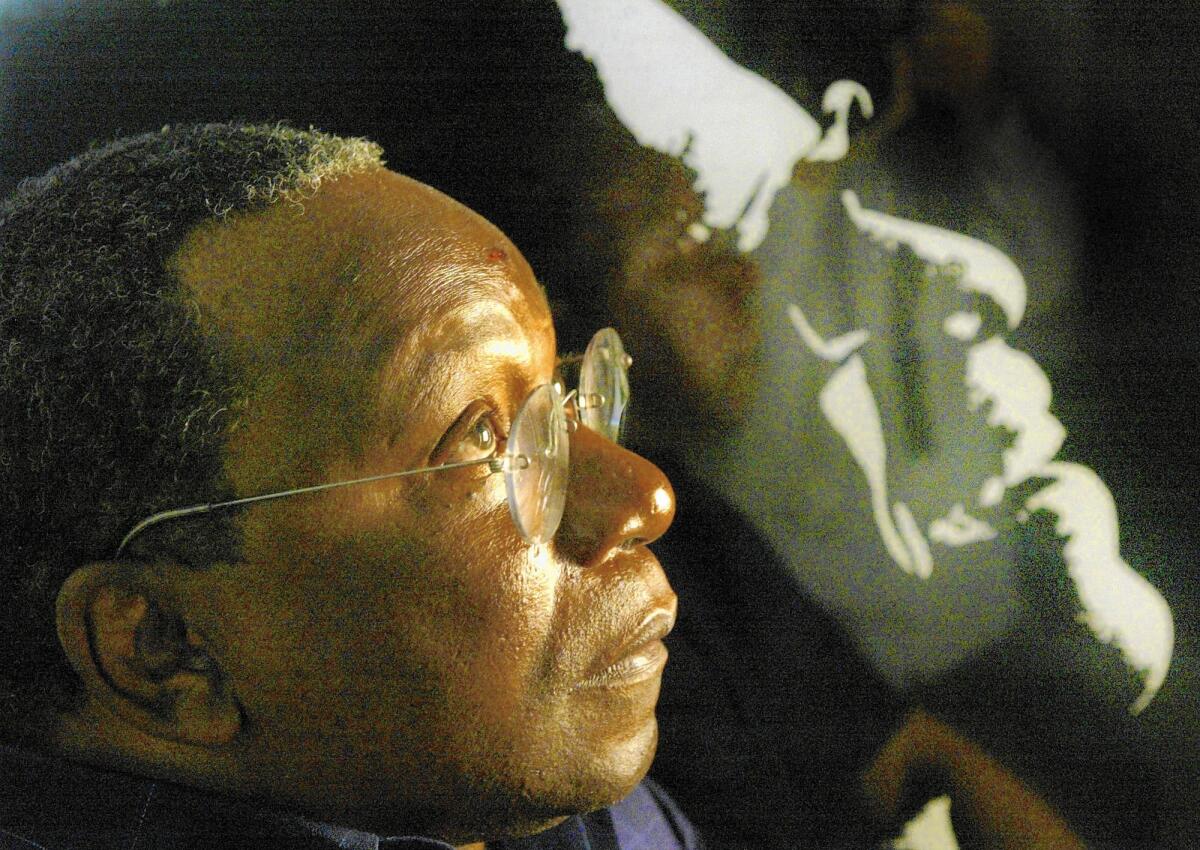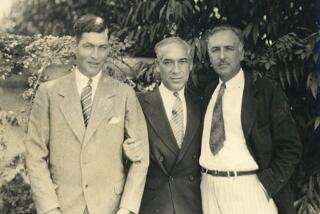James L. White dies at 67; wrote screenplay for Ray Charles biopic ‘Ray’

James White saw parallels between his life and that of singer Ray Charles. Both were African Americans who grew up in the rural Jim Crow South and both had been heroin addicts at one time. “Ray” received a best picture Academy Award nomination.
When James L. White was being raised by a single mother in rural Kentucky, he was taunted by children who chanted, “Who’s your daddy?”
So he would tell stories.
“I’d come up with someone who was famous, like Jackie Robinson or Bill Cosby, and I’d say they were my daddy,” White said in a 2005 Times interview. “I’d make up all kinds of stories so I’d have something to say back to them.”
He grew up to tell stories in screenplay form. White wrote the script for “Ray,” the 2004 biographical film about singer Ray Charles that was nominated for a best-picture Oscar.
White, 67, whose only feature credit was on “Ray,” though he had several projects in development, died Thursday at his home in Santa Monica. The cause was liver and pancreatic cancer, said his attorney, Matthew Saver.
In the early 1990s, White met with producer Stuart Benjamin who was trying to put together a Ray Charles biopic. Benjamin admired White’s writing samples, and there were similarities in the backgrounds of the singer and writer — both were African American men who grew up in the rural South and endured segregation, and both at one point in their lives were heroin addicts.
But Benjamin didn’t have funding to pay for a script, and White was getting other work. In 1992, actor Sidney Poitier hired him to write a thriller called “Red Money.”
“I would like to publicly thank Mr. Poitier,” White said in 2005 in accepting an award from the Friends of the Black Oscar Nominees group in Los Angeles, “who was the first person in Hollywood to take a chance on me as a screenwriter.”
The Poitier film wasn’t made, and neither were several other projects White was engaged to write, including a biopic on star athlete Bo Jackson.
Finally, the money was raised for the Charles film, but then White had to deal with the imposing singer of hits such as “What’d I Say” and “Hit the Road Jack.” Charles, who had broken though many barriers in his life, had a reputation for being prickly.
White asked him at their first meeting, “The type of movie I should write is a love story. What do you think?” And Charles shot back, “You’re the writer. What do you think?”
But then Charles asked about White’s background, and when he learned that the writer had grown up in a small town in the South, they began to bond.
“He opened up to me,” White said in the Times interview. “We’d talk all the time, and whenever I was struggling with a scene, he’d say, ‘Jimmy, you know how to do it. You’ve been there.’”
White was born in Mount Sterling, Ky., on Nov. 15, 1947. “My father was someone my mother knew who attacked her,” he said, “and out of that violence I was conceived.”
As he grew older he looked for a way out of the rural town.
“The only real way out was through sports or the military, and even though I played football and ran track, I wasn’t fast enough or big enough, and so after high school, I joined the military,” he told the Vancouver Sun in 2005. He was in the Navy during the Vietnam War, then afterward used the G.I. Bill to enroll at the University of Massachusetts.
But White left school after about a year and worked at several jobs. And he picked up a drug habit. “In Boston, I became a health inspector and a junkie at the same time,” he said in The Times interview. “It was stupidity, just me trying to prove I was hip like everyone else.”
White moved to Los Angeles in the mid-1970s because he wanted to be a screenwriter, and worked at a variety of jobs, including car salesman. In 1978 he met his future wife, Elizabeth, but he hadn’t yet kicked his drug habit. Finally, in 1985, she told him she was leaving him and taking their baby with her.
“The thought of losing her, or my son being like me, was too horrible to imagine,” he said, and he quit drugs.
In addition to his wife, White is survived by daughters Monee and Martina; and son James II.
After the success of “Ray,” doors opened up to White in Hollywood, but his son said in an interview Thursday that his father was particular about the projects he took on. “He wanted to make things his own way,” James White II said. “He felt a responsibility to write characters of African American descent who were not stereotypes.”
One of his pet projects was a biopic on blues singer and songwriter Robert Johnson — who died in 1938 at age — 27 — that White hoped to direct as well as write.
“Up until 20 days ago when he went into the hospital,” James White II said of his father, “he was still taking meetings.”
Twitter @davidcolker
More to Read
Start your day right
Sign up for Essential California for the L.A. Times biggest news, features and recommendations in your inbox six days a week.
You may occasionally receive promotional content from the Los Angeles Times.







